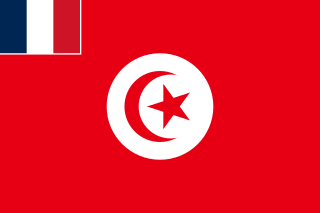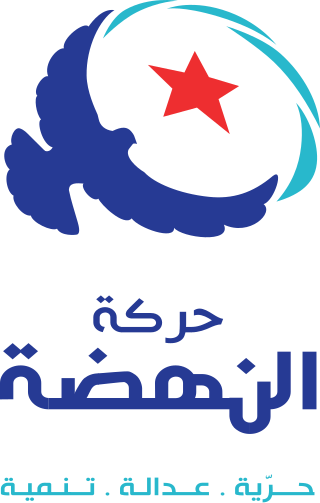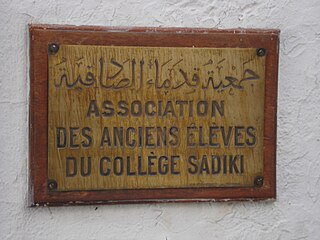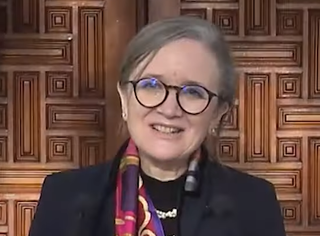
Slim Khalbous is a Tunisian politician. He serves as the Tunisian Minister of Higher Education and, since 1 May 2017, National Education. [1]

Slim Khalbous is a Tunisian politician. He serves as the Tunisian Minister of Higher Education and, since 1 May 2017, National Education. [1]

Tunisia, officially the Republic of Tunisia, is the northernmost country in Africa. It is a part of the Maghreb region of North Africa, bordered by Algeria to the west and southwest, Libya to the southeast, and the Mediterranean Sea to the north and east. Tunisia also shares maritime borders with Italy through the islands of Sicily and Sardinia to the north and Malta to the east. It features the archaeological sites of Carthage dating back to the 9th century BC, as well as the Great Mosque of Kairouan. Known for its ancient architecture, souks, and blue coasts, it covers 163,610 km2 (63,170 sq mi), and has a population of 12.1 million. It contains the eastern end of the Atlas Mountains and the northern reaches of the Sahara desert; much of its remaining territory is arable land. Its 1,300 km (810 mi) of coastline includes the African conjunction of the western and eastern parts of the Mediterranean Basin. Tunisia is home to Africa's northernmost point, Cape Angela. Located on the northeastern coast, Tunis is the capital and largest city of the country, which is itself named after Tunis. The official language of Tunisia is Modern Standard Arabic. The vast majority of Tunisia's population is Arab and Muslim. Vernacular Tunisian Arabic is the most spoken, and French also serves as an administrative and educational language in some contexts, but it has no official status.

Tunisia's population was estimated to be around 12.04 million in 2022. In the generally youthful African continent, Tunisia's population is among the most mature. This is because the government has supported a successful family planning program that has reduced the population growth rate to just over 1% per annum, contributing to Tunisia's economic and social stability.

Tunis is the capital and largest city of Tunisia. The greater metropolitan area of Tunis, often referred to as "Grand Tunis", has about 2,700,000 inhabitants. As of 2020, it is the third-largest city in the Maghreb region and the eleventh-largest in the Arab world.

Zine El Abidine Ben Ali, commonly known as Ben Ali or Ezzine, was a Tunisian politician who served as the second president of Tunisia from 1987 to 2011. In that year, during the Tunisian revolution, he was overthrown and fled to Saudi Arabia.

The Tunisia national football team represents Tunisia in men's international association football. The team is a member of both FIFA and CAF, the Confederation of African Football. It is governed by the Tunisian Football Federation, founded in 1957. Colloquially known as the Eagles of Carthage, the team's colours are red and white, and the bald eagle is its symbol. Most of Tunisia's home matches are played at the Hammadi Agrebi Stadium in Radès since 2001.

Islam is the official state religion in Tunisia. According to the United States CIA, 99.1% of its adherents are Sunni Muslims. The constitution of Tunisia states that the country's “religion is Islam”, the government is the “guardian of religion”, and requires that the president be Muslim. The predominant madhhab in the country is the Maliki school. The Tunisian island of Djerba is home to a population of Ibadi Muslims.

Espérance Sportive de Tunis, known as ES Tunis or simply EST for short, and nicknamed “Mkashkha”, The Elder of Tunisian Clubs, The Blood and Gold Club and The Beast of Africa is a Tunisian professional sports club. It was founded on 15 January 1919 in the Bab Souika neighborhood in Tunis. Its best known football section has been active in the first Tunisian Professional League 1 since 1936, during which it played 63 seasons, except for the 1970–71 season.

Club Sportif Sfaxien, known as CS Sfaxien or simply CSS for short, is a Tunisian football club based in Sfax. The club was founded in 1928 and its colours are black and white (Bianconero). Their home stadium, Taieb Mhiri Stadium, has a capacity of 12,000 spectators. The club is currently playing in the Tunisian Ligue Professionnelle 1.

Tunis University is a public university in Tunis, Tunisia. It was founded in 1960 on the basis of earlier educational establishments.
The University of Sfax is a university located in Sfax, Tunisia. It was founded in 1986 under the name University of the South with the purpose of covering all academic institutions in Southern Tunisia. It is divided into three universities, including the current University of Sfax, with the creation of the University of Gabes in 2003 and the University of Gafsa in 2004.
Since gaining independence from France in 1956, the government of Tunisia has focused on developing an education system which produces a solid human capital base that could respond to the changing needs of a developing nation. Sustained structural reform efforts since the early 1990s, prudent macroeconomic policies, and deeper trade integration in the global economy have created an enabling environment for growth. This environment has been conducive to attain positive achievements in the education sector which placed Tunisia ahead of countries with similar income levels, and in a good position to achieve MDGs. According to the HDI 2007, Tunisia is ranked 90 out of 182 countries and is ranked 4th in MENA region just below Israel, Lebanon, and Jordan. Education is the number one priority of the government of Tunisia, with more than 20 percent of government’s budget allocated for education in 2005/06. As of 2006 the public education expenditure as a percentage of GDP stood at 7 percent.

Faouzi Benzarti is a Tunisian professional football manager and former player and the current head coach of the Tunisia national team. He spent his entire career as a player at his home club US Monastir without any achievements. His coaching career began and was only 29 years old, making it the youngest Tunisian coach at the time. He is considered one of the most successful coaches in Tunisia. He usually uses offensive play and a high-pressure plan as he is known for his toughness in training and his excessive anger towards his players and referees. During his managerial career, he was in charge of two national teams: the Tunisian and Libyan national football teams, he was also close to signing with the Moroccan team in 2016 before appointing Hervé Renard.

The French protectorate of Tunisia, officially the Regency of Tunis and commonly referred to as simply French Tunisia, was established in 1881, during the French colonial empire era, and lasted until Tunisian independence in 1956.

The Tunisian revolution, also called the Jasmine Revolution and Tunisian Revolution of Dignity, was an intensive 28-day campaign of civil resistance. It included a series of street demonstrations which took place in Tunisia, and led to the ousting of longtime dictator Zine El Abidine Ben Ali in January 2011. It eventually led to a thorough democratization of the country and to free and democratic elections, which had led to people believing it was the only successful movement in the Arab Spring.

The Ennahda Movement, also known as the Renaissance Party or simply known as Ennahda, is a self-defined Islamic democratic political party in Tunisia.

Of the languages of Tunisia, Arabic is the sole official language according to the Tunisian Constitution.
Since the December 2010 revolution in Tunisia and protests across the Middle East and North Africa (MENA) began, Tunisian women have played an unprecedented part in the protests. Habib Bourguiba began instituting secular freedoms for women in 1956, such as access to higher education, the right to file for divorce, and certain job opportunities. Women in Tunisia enjoy certain freedoms and rights that are denied to women in neighboring countries, although the social norms have shifted since 2011.

Visitors to Tunisia must obtain a visa from one of the Tunisian diplomatic missions unless they come from one of the visa exempt countries.

The Ministry of Education is responsible for the administration of education in Tunisia. It has its headquarters at Boulevard Bab Bnet 1030 in Tunis. As of 2015 it was directed by Néji Jalloul. In May 2017, the government fired Jalloul and replaced him with Slim Khalbous.

The Bouden Cabinet was the government of Tunisia from 2021 to 2023. It is headed by Najla Bouden, the first female prime minister in Tunisia and the Arab world. The formation was result of ongoing political instability and an economic crisis as a result of the COVID-19 pandemic in Tunisia.